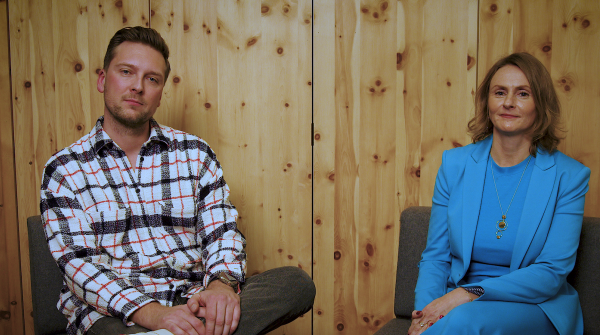- Sparring for start-ups: boxing as a role model
- Storytelling as a success factor
- Fresh water from the river
- Visibility through strong pitches and feedback
- You should avoid these mistakes when pitching
- A Norwegian becomes the star of ISPO 2024
- Be brave and get in the ring
- Useful tips: How start-ups can maximize their chances in the pitch
Founder and host Jan C. Küster took the idea for this interactive, dynamic and direct pitch battle from the boxing ring - and for good reason. Just like in the ring, the participants have to adapt to their opponents at lightning speed and react spontaneously to critical questions - a key skill when talking to potential investors. However, despite the competitive nature of the format, it is not only confrontational, but also constructive: even those who fail gain valuable contacts and can develop further. Since the format was created in Munich over 15 years ago, Jan C. Küster has already seen around 10,000 pitch presentations. As an experienced start-up expert, he knows exactly what is important in a convincing pitch.
A good product alone is not enough - the story behind it often determines success or failure. The best start-ups know how to bring their idea to life with an emotional story. The Norwegian start-up VITALOOP provided an impressive example of this at ISPO 2024.
"Pitch, please!" - every round of the Founders Fight Club starts with these words, and both presenter Jan C. Küster and the audience wait eagerly to see what happens in the next 60 seconds. Founder Arild Vikingstad calmly entered the Yellow Stage on the first day of the trade fair, presented his new product - and made the competition look old with just one sentence. Anyone who thought there were already enough outdoor bottles was proved wrong.
"This bottle solves the world's water problem," says Vikingstad. Bang! That really hit the spot. The audience was wide awake and listened attentively to the Norwegian's story.
With VITALOOP, the Norwegian has developed a portable water filter that delivers clean and tasty drinking water at the touch of a button. The secret lies in the technology: a multi-stage filter system removes harmful substances while retaining valuable minerals. Bacteria, parasites, chemicals, heavy metals and microplastics are all filtered out.
Fresh water from the Elbe, Isar or Danube? No problem. After just a few sentences, it was clear that this simple 480 ml bottle has enormous potential.

Start-ups face numerous challenges - but with the right strategies, they can prevail. Visibility, networks and storytelling are key success factors. Formats such as the "Founders Fight Club" offer young companies the opportunity to network with potential investors and partners.
But a convincing pitch is more than just a presentation - it is a tool for positioning yourself on the market and establishing long-term collaborations. Networks are the key to growth. However, it is just as important to deal with criticism and defeat in the right way.
Küster says with a wink:
'Our participants* know that the best pitch doesn't necessarily win. The voting system is just as corrupt as boxing itself. Whoever brings the most friends usually wins.
But that's part of the game. Because maximum visibility is often achieved precisely through critical debate. Start-ups that are open to feedback and learn from it not only gain investors, but also valuable insights for their further development.
"Our job is also to equip the founders with knowledge. And whether they end up being successful or not is ultimately up to them," explains Küster.
The assumption that a good product alone carries the pitch is fundamentally wrong. "The pitch is not the main focus, but the transition to an in-depth Q&A. If you don't manage to answer questions confidently or respond convincingly to critical questions, you risk losing the trust of investors," warns Küster.
Successful pitches are characterized by strong storytelling, convincing facts and a clear structure. Emotions play a decisive role. Emotions play a crucial role. And finally, the pitch must not be too technical. An example? Shoes made from hemp may be a great product, but without a gripping story, they remain uninteresting for investors. They will only invest if they recognize a clear market differentiation.
The sporting goods sector in particular shows that start-ups need to focus on either technology or sustainability in order to stand out from the competition. Küster says:
Those who do not clearly decide on a direction remain interchangeable and ultimately do not achieve success.
The founder of VITALOOP, Arild Vikingstad, has done a lot of things right. A few years ago, he was still working as a barista and gained valuable experience with different water qualities - and their influence on the taste of coffee. At some point, he came up with the idea for VITALOOP - and now fresh water is available at the touch of a button.
The Norwegian impressed both the ISPO 2024 audience and the jury with his impressive storytelling. The reward: three awards - best outdoor product, a special honor from Globetrotter and even the overall victory across all categories. A success that has never before been achieved in this form for a young company at ISPO.
"I am super happy and grateful for this great success at ISPO. I really didn't expect this," said Arild Vikingstad. The biggest challenge along the way? "The design of the bottle. I had to develop something that met the requirements and needs of consumers as well as, for example, aid organizations or the military," Vikingstad told ISPO. He seems to have succeeded.
Formats such as the "Founders Fight Club" are not suitable for every start-up - they require courage. But the risk is low: those who lose take away valuable lessons, those who win can achieve a lot.
One example of this is Arild Vikingstad with VITALOOP. He is following in the footsteps of Movmenta, a British start-up that impressed last year with its idea: a sensor for running shoes that measures the absorption of the sole in real time and thus recognizes when shoes should be replaced - an innovation that can prevent injuries.
Movmenta CEO Ofir Dagan looks back on his pitch at the "Founders Fight Club" with mixed feelings - critical, but also satisfied:
At the time, we focused more than necessary on the technical details of our technology instead of emphasizing the tangible benefits and market potential for consumers* and brands. We realized that simplifying the message and highlighting how Movmenta solves real-world problems resonates better with a broader audience, especially investors and non-technical stakeholders.
A valuable insight that the start-up took away from ISPO. However, it didn't do it any harm - on the contrary: it was able to attract a strong investor in Mischa Zverev. For up-and-coming start-ups, this means one thing above all: show courage! So, "Pitch, please!"
Your next big opportunity to take your start-up to the next level is from 30 NOV. - 02. DEC. 2025 at the ISPO in Munich. Are you ready to present your ideas to an international audience and investors, make valuable contacts and receive direct feedback from industry experts? Then become part of ISPO and secure your place today!
- Focus on pathos and logos in communication: A convincing pitch combines emotional appeal (pathos) with logical arguments (logos). The ability to use both in a targeted manner is crucial. Küster encourages founders to actively train their communication skills, because not everyone is naturally a charismatic speaker - but everyone can learn it. "A good product is important - but the way you present it determines your success," recommends Küster. Those who take these lessons to heart have the best chance of surviving in the highly competitive start-up world.
- Bringingthe right employees into the team: An often underestimated success factor is the team composition. For example, founders with catering experience often have a high level of social empathy. This can help to establish a connection with the audience. Choosing the right team members can therefore have a direct impact on pitch success.
- Accept failure as part of the process: Not every pitch leads to success - and that's okay. Dealing with failure is a crucial skill for founders. Those who learn from mistakes and continue to develop will stay in the game in the long term.
- Courage to make unconventional decisions: Good founders are often willing to take risks - be it through unconventional financing strategies or radical decisions to pursue their vision. Start-ups that have the courage to break new ground often prevail over the competition.
- Awards
- Mountain sports
- Bike
- Fitness
- Health
- ISPO Munich
- Running
- Brands
- Sustainability
- Olympia
- OutDoor
- Promotion
- Sports Business
- Textrends
- Triathlon
- Water sports
- Winter sports
- eSports
- SportsTech
- OutDoor by ISPO
- Heroes
- Transformation
- Sport Fashion
- Urban Culture
- Challenges of a CEO
- Trade fairs
- Sports
- Find the Balance
- Product reviews
- Newsletter Exclusive Area
- Magazine







